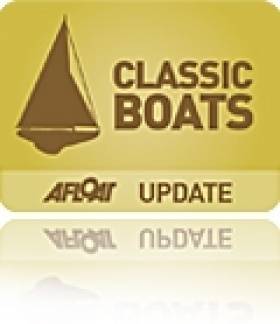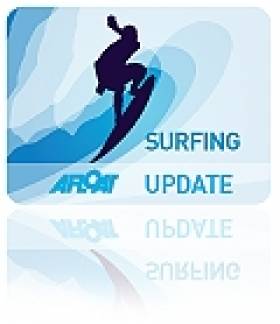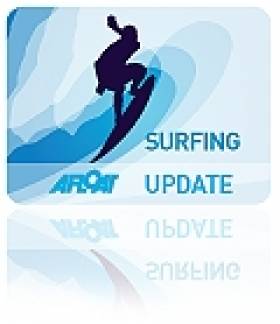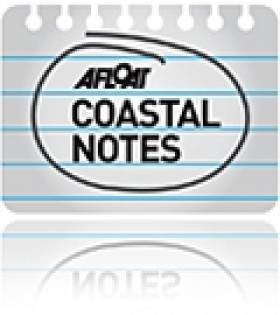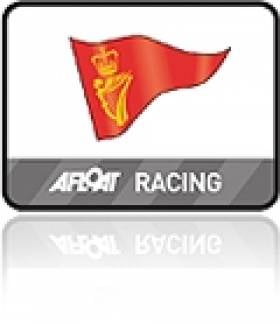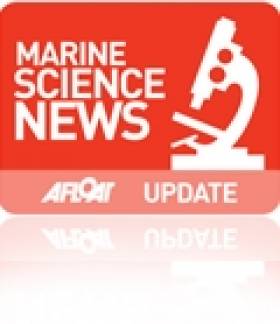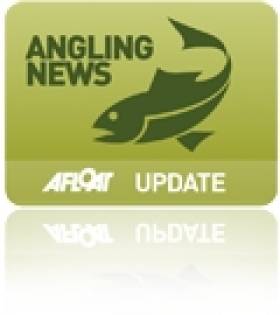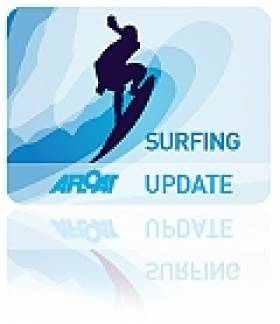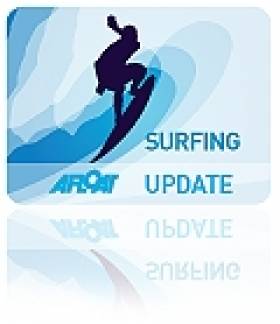Displaying items by tag: film
#historicboats – There is a small group of islands in the Lesser Antilles where the traditions of boatbuilding were once crucial to the survival of local communities skimming a living from the sea. Hundreds of sailing vessels were once launched here, more than anywhere in the West Indies.
Today there is no more trading by sail, and these skills have vanished elsewhere in the region.
The film "Vanishing Sail" represents over fifteen years of research and documenting the art form of wooden boatbuilding in the Eastern Caribbean.
The Premiere of the movie "Vanishing Sail" - what a night! West Indies sloops & schooners from up and down the islands gathered on the dock for the 20th anniversary St. Barth Film Festival.
By nightfall the crowd swelled to 350 + people, a brief intro and the music of the sea began. The dock became wrapped in silence, only the creaking of mooring lines, the vessels all swaying together lit by the moon, all feeling the story as one.
Very powerful indeed to finally see our film come alive on a huge screen with such a wonderful audience followed by a standing ovation.
The film will be screened at selected Film Festivals during this summer & fall prior to a general release.
Shore Shots Film Fest Is 'Roaring Success'
#Surfing - Ireland's first ever surfing themed film festival has been hailed as a "roaring success" all round, according to surf website Magicseaweed.
The Shore Shots Irish Surf Film Festival - which took over the Light House Cinema and the Generator Hostel in Dublin's Smithfield last weekend, as previously reported on Afloat.ie - featured the Irish premieres of five new big-screen surfing films, including the 3D epic Storm Chasers.
But it was the Short Film section attracted the most excitement and plaudits over the two days, with an edit of Fergal 'Ferg' Smith - tackling the biggest and best waves Ireland has to offer over two years - claiming top prize in the category.
Others of note in the shortlist include bodyboarder Peter Clyne and some truly exciting POV footage from Dylan Scott - shot with a single GoPro and put together on the smallest of budgets.
North Of Nowhere from Peter Clyne - Outer Cells on Vimeo.
trendynewatrocity2 - By Dylan Stott from MSW on Vimeo.
Magicseaweed has much more on happenings from the festival HERE.
Ireland's First Surf Film Festival Comes To Smithfield
#Surfing - Ireland's first ever surfing themed film festival is set to take place in Dublin later this month.
The Shore Shots Irish Surf Film Festival 2013 will take over the Light House Cinema and Generator Hostel in Smithfield on the weekend of 23-24 March with the Irish premieres of five new big-screen surfing titles.
"We’ve got all the latest footage from the global surf scene, award-winning movies and tales of travel and adventure from men and women who have devoted their lives to exploring and sharing the water around us," say the organisers.
The festival kicks off with the premiere of Here & Now, the work of more than 25 filmmakers and surfers who worked together to document the world of surfing in a single 24-hour period.
It's followed the the first Irish showing of the epic 3D adventure Storm Surfers, a documentary following two best friends on their quest to hunt down and ride the biggest and most dangerous waves in Australia.
The second day will see showings of 180 South, which retraces the epic 1968 journey of Yvon Chouinard and Doug Tompkins to Patagonia; North of the Sun, documenting two surfers extreme experience throughout nine months of winter in a remote part of Norway; and Come Hell or High Water, which tells the remarkable history of bodysurfing.
Both days will also feature an exhibition of stunning surf photography captured by some of the best in the business, a short film competition - and a proper party atmosphere!
Find out more at the official festival website or the Shore Shots Facebook page.
Windy City Premiere For Short Film Shot in West Cork
#CoastalNotes - A new Irish short film shot on location on the south-west coast will have its premiere in Chicago this weekend, as the Southern Star reports.
The Blow-Ins is a 15-minute adventure comedy that was shot in Courtmacsherry, Kilbrittain and other picturesque coastal spots in West Cork.
It fictionalises story of the notorious Kilbrittain whale that washed ashore in 2009, as a family of 'blow-ins' from the capital attempt to rescue the stranded cetacean.
Written and directed by CJ Scuffins for Story Factory, The Blow-Ins will premiere at the 14th Chicago Irish Film Festival from Friday 1 March after its recent acclaim at the recent Corona Cork Film Festival.
The Southern Star has more on the story HERE.
RCYC Hosts 'Moby Dick' Screening
#ROYAL CORK - It was "uncharted waters" for the Royal Cork Yacht Club in Crosshaven last night as it hosted its first ever film screening, a showing of the John Huston classic Moby Dick.
The epic adventure, starring Gregory Peck, was shot on location in nearby Youghal, and tells the story of the obsessed Captain Ahab's pursuit of the titular whale.
Joleen Cronin of the Crosshaven Film Club told the Irish Examiner: "There are lots of people throughout Cork who were involved in the making of the film and it’s a real celebration of movie making and special effects for its time."
The screening is hoped to be the first of many special events at the world's oldest yacht club, which will be hosting the biennial Cork Week regatta from 7-13 July.
Marine Movie Competition Seeks 'Links Between Ocean and Daily Life'
If you fancy yourself as a marine movie maker, a latter day Jacques Cousteau, a Stephen Spielberg or you just like making movies then here is your chance to make it on to the big screen.
Enter the International Mário Ruivo Marine Movie Competition and you could win a cash prize of up to €3,000. All you need to do is make an original 15 minute DVD on the theme: "The Seas and Us – links between the Ocean and daily Life";
In order to enter you must be in full time education and between the ages of 12 to 21 years.
Submit your DVD by the deadline of 25th March 2012.
Prizes include: €2,000 (Junior: 12 – 18 years); €3,000 (Senior: 18 – 21 years) and a trip to Lisbon, Portugal (September 2012), to pick up your prize.
Follow this link for more information the competition.
Fishing in Blue Stacks Highlighted in New Film
#ANGLING - A new film on fishing in south Donegal will have its premiere this Thursday, the Donegal Democrat reports.
The film, The Blue Stack Mountains, is the fourth in a series on angling in Ireland by German producer Dietrich Bohnhorst, whose previous angling documentaries have been broadcast on television around the world.
According to Bohnhorst, who has lived in Donegal for 25 years, his latest film “describes a journey from Glenties, through Commeen, Stranorlar, Ballybofey and back over Barnesmore Gap to Donegal town."
It also pays special attention to “about 40 lakes which lie in the Blue Stacks, how to get there and where to fish, what flies to use and so on.”
Bohnhorst hopes his film will help to break the "invisible line" that he says has cut off the "under-promoted" Donegal from the marketing of angling in Ireland.
All are invited to the premiere at Solis Lough Eske Castle this Thursday at 8pm. Admission is free.
Ireland's Big Wave Surfers Showcased in New Film
Ireland's first ever 'big wave' surfing contest has been immortalised in a new documentary film (SEE TRAILER BELOW).
High Pressure – The Story of Ireland’s First Big Wave Surfing Contest follows the story of those hardy souls who took on the monster waves at Sligo's Mullaghmore Head in the inaugural Tow-in Surf Session last February.
Produced, directed and edited by Dave Mottershead and Daniela Gross, the film also examines the philosophy of big-wave surfing and the value of the waves to Irish coastal communities, and is described as a "must-see and must-have" by website Surfer Today.
"Local surfers believe there are still new surf spots to be found and challenged on the Irish coast," the site adds, noting that the film "opens the professional book of surfing in Ireland".
For further enquiries regarding High Pressure – The Story of Ireland’s First Big Wave Surfing Contest, contact [email protected].
'Soul Surfer' Gala Screening at Eurosurf 2011
A new film telling the true story of Hawaiian surfer Bethany Hamilton will have its gala Irish screening following the opening ceremony of Eurosurf 2011 in Bundoran on Saturday 24 September.
Soul Surfer stars AnnaSophia Robb as Hamilton, who lost her arm in a shark attack yet battled against all odds to become a champion again.
The film features an all-star cast including Helen Hunt, Dennis Quaid and American Idol winner Carrie Underwood in her film debut.
The story also has a special connection to Bundoran, as Bethany Hamilton is descended from a well-known family in the area. Bethany even visited the town some years ago to find out more about her heritage.
"We are thrilled to have the gala Irish screening of Soul Surfer as part of the opening festivities for Eurosurf," said press officer Shane Smyth. "Such an inspirational film is bound to inject even more enthusiasm for the competitors taking part in the European Surfing Championships as the contest prepares to kick off.
"Having already seen the film, I can say that viewers are in for a treat – some stunning photography and some awesome surfing.”
The European Surfing Championships take place in Bundoran from 24 September to 2 October.



























